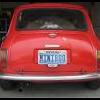Trying to sort out the running on my new mini, its a 1275 bored out to a 1340, engine number 12H706AA (if this helps) and a hif44. Not too good with engines but played with it tonight and ended up backfiring all over the place - arsed it right up, can anyone tell me what the timing should be at what revs?? Need to get it sorted by Sunday for the Brighton mini show.

Timing
Started by
DavesBluey
, Jul 11 2006 09:52 PM
4 replies to this topic
#1

Posted 11 July 2006 - 09:52 PM
#2

Posted 11 July 2006 - 09:56 PM
depend but 8 before tdc at tic over with no vac advance is a start
dave
dave
#3

Posted 12 July 2006 - 11:00 AM
anyone else?? i need the to know the valve clearences as well?
and can anyone have any idea what year the engine is going by the engine number above??
Dave - how much would you charge to set this up properly?
and can anyone have any idea what year the engine is going by the engine number above??
Dave - how much would you charge to set this up properly?
#4

Posted 12 July 2006 - 11:25 AM
does timing make a differnce depending on what perol is being used?>
#5

Posted 12 July 2006 - 12:08 PM
Just to get the engine started, regardless of any mods, setting a static timing between 5-8 BTDC is a good place as Minidaves said. Does the petrol you use affect the timing you should set? In a word, yes.
Though presented in the manuals and books as carved in stone, it isn't exactly so. It is safe to say that the absolute maximum advance an engine can safely handle is somewhere about 35 BTDC when all the mechanical and vacuum advance have kicked in to their maximum. That doesn't help you much. But it introduces the concept.
Your goal should be to set the car up with as much advance as it can handle without knocking and pinging under load. Start with say 8-BTDC and take the car for a drive. Put the car in 3rd gear and try accelerating up a hill where you normally would downshift... but leave it in 3rd and accelerate. If you hear knocking and pinging, slightly retard the timing. If you don't, advance the timing and repeat your test. When you get to the point where the knocking and pinging is just heard under load... back the timing off a little bit until it just goes away. That's your maximum advance for YOUR engine with YOUR fuel.
Note the last line, YOUR FUEL. You'll find when setting the max advance that when you run high-octane fuel the engine can handle more advance before the pinging and knocking start. This is the ONLY way that high-octane fuel can "give" your car more power. The fuel itself has no more energy than regular fuel. Where it helps is by allowing more advance which in turn allows you to develop more power. Without the timing change, running high-octane fuel is a waste of money.
Before leaving this thread, valve clearances? Aren't all standard ratio rockers set to 0.012" [0.30mm] cold? Changes to this value for longer ratio arms (like 1.5:1) were mentioned recently in another thread so if you've got something other than standard rocker arms, use the search feature to find the old thread.
Though presented in the manuals and books as carved in stone, it isn't exactly so. It is safe to say that the absolute maximum advance an engine can safely handle is somewhere about 35 BTDC when all the mechanical and vacuum advance have kicked in to their maximum. That doesn't help you much. But it introduces the concept.
Your goal should be to set the car up with as much advance as it can handle without knocking and pinging under load. Start with say 8-BTDC and take the car for a drive. Put the car in 3rd gear and try accelerating up a hill where you normally would downshift... but leave it in 3rd and accelerate. If you hear knocking and pinging, slightly retard the timing. If you don't, advance the timing and repeat your test. When you get to the point where the knocking and pinging is just heard under load... back the timing off a little bit until it just goes away. That's your maximum advance for YOUR engine with YOUR fuel.
Note the last line, YOUR FUEL. You'll find when setting the max advance that when you run high-octane fuel the engine can handle more advance before the pinging and knocking start. This is the ONLY way that high-octane fuel can "give" your car more power. The fuel itself has no more energy than regular fuel. Where it helps is by allowing more advance which in turn allows you to develop more power. Without the timing change, running high-octane fuel is a waste of money.
Before leaving this thread, valve clearances? Aren't all standard ratio rockers set to 0.012" [0.30mm] cold? Changes to this value for longer ratio arms (like 1.5:1) were mentioned recently in another thread so if you've got something other than standard rocker arms, use the search feature to find the old thread.
1 user(s) are reading this topic
0 members, 1 guests, 0 anonymous users















